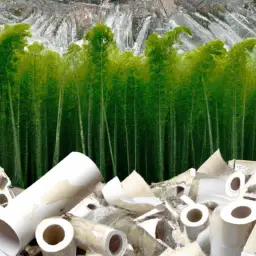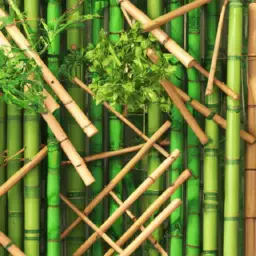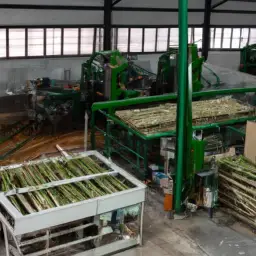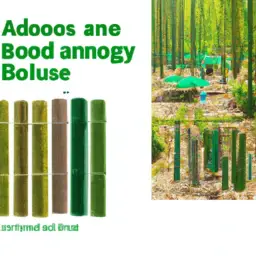I’ve discovered a revolutionary solution that’s saving our forests: bamboo products. In this article, I’ll show you how bamboo toilet paper and other sustainable bamboo products are helping to reduce deforestation and protect our environment.
From the environmental impact of traditional toilet paper manufacturing to the benefits of using renewable bamboo resources, we’ll explore the innovations in bamboo product manufacturing and how you can support forest conservation by choosing bamboo.
Get ready to be amazed by the power of bamboo in saving our forests.
The Environmental Impact of Traditional Toilet Paper Manufacturing

The environmental impact of traditional toilet paper manufacturing is significant and should be considered when making purchasing decisions. When you think about it, the process of producing toilet paper from trees involves cutting down vast amounts of forests and using chemicals in the manufacturing process. This not only contributes to deforestation but also releases harmful pollutants into the environment. It’s a problem that needs to be addressed.
Thankfully, there are alternative options available that are much more eco-friendly. One such alternative is bamboo toilet paper. Bamboo is a fast-growing and renewable resource that doesn’t require the same amount of land and water as trees. It can be harvested sustainably without causing deforestation. Additionally, bamboo toilet paper is manufactured using eco-friendly processes that minimize the use of chemicals and reduce pollution.
By choosing toilet paper alternatives like bamboo, we can make a positive impact on the environment. Not only are we preventing deforestation, but we’re also supporting sustainable manufacturing practices. It’s a small change that can have a big impact in the long run.
How Bamboo Toilet Paper Helps Reduce Deforestation

Using bamboo toilet paper is a sustainable and effective way to combat deforestation. It helps to reduce the demand for traditional toilet paper made from trees. Bamboo toilet paper alternatives are becoming increasingly popular due to their eco-friendly nature.
Bamboo is a sustainable alternative because it’s a fast-growing plant that can be harvested in just a few years, compared to traditional trees that take decades to reach maturity. This means that bamboo can be replenished more quickly, reducing the need to cut down large numbers of trees for toilet paper production.
In addition to being a renewable resource, bamboo also has other benefits that make it an ideal material for toilet paper. It’s naturally antibacterial and hypoallergenic, making it gentle on the skin and suitable for people with sensitive skin or allergies. Bamboo toilet paper is also softer and more absorbent than traditional toilet paper, providing a luxurious experience while still being environmentally friendly.
The Benefits of Using Sustainable Bamboo Products

As someone who cares about the environment, I’m excited to share the benefits of choosing sustainable bamboo products.
Bamboo is an incredibly versatile and sustainable material that offers numerous advantages over traditional materials. One of the main benefits is its sustainability. Bamboo is a fast-growing plant that can be harvested within three to five years, compared to hardwood trees that take decades to mature. This rapid growth rate ensures a continuous and renewable supply of bamboo without causing deforestation or habitat destruction.
Another benefit of using sustainable bamboo products is their durability. Bamboo is known for its strength and resilience, making it an excellent choice for various applications, from furniture to flooring. Additionally, bamboo products are naturally resistant to pests, mold, and mildew, reducing the need for harmful chemicals and pesticides.
In terms of environmental impact, bamboo products are highly sustainable. Bamboo plantations absorb more carbon dioxide and release more oxygen than equivalent stands of trees, making them effective in combating climate change. Furthermore, bamboo requires minimal water and pesticides to grow, making it an eco-friendly alternative to other materials.
Lastly, using sustainable bamboo products can contribute to rural development and poverty alleviation. Bamboo cultivation provides income opportunities for local communities, especially in developing countries where bamboo is abundant. By supporting the bamboo industry, we can help create sustainable livelihoods and improve the well-being of these communities.
Bamboo as a Renewable Resource for Forest Conservation

While bamboo is often overlooked as a renewable resource, it plays a crucial role in forest conservation efforts. Bamboo cultivation is an excellent alternative to traditional timber harvesting, as it offers numerous environmental benefits. Sustainable forestry practices are essential for preserving our forests and mitigating climate change. Bamboo stands out as a sustainable choice due to its rapid growth and regenerative properties.
| Benefit | Description |
|---|---|
| Fast Growth | Bamboo is one of the fastest-growing plants on Earth, with some species capable of growing up to 91 cm (36 inches) in just 24 hours. Its rapid growth ensures a sustainable supply of raw material for various industries. |
| Low Environmental Impact | Bamboo cultivation requires minimal water, pesticides, and fertilizers compared to other crops. It also helps prevent soil erosion and improves air quality by absorbing more carbon dioxide and releasing oxygen into the atmosphere. |
| Biodiversity Conservation | Bamboo forests provide habitats for various plant and animal species. By promoting bamboo cultivation, we can protect and restore ecosystems, preserving biodiversity for future generations. |
Innovations in Bamboo Product Manufacturing

I’ve noticed some exciting innovations in bamboo product manufacturing. As we continue to search for sustainable alternatives to traditional materials, bamboo has emerged as a frontrunner due to its rapid growth and durability. What’s even more impressive is the development of eco-friendly manufacturing processes that further enhance bamboo’s environmental benefits.
One notable innovation in bamboo product manufacturing is the use of non-toxic adhesives. Traditional adhesives often contain harmful chemicals that can leach into the environment during production and use. However, manufacturers have now started using natural, plant-based adhesives in the production of bamboo products. These adhesives not only ensure the structural integrity of the products but also align with the eco-friendly nature of bamboo itself.
Another exciting development is the utilization of advanced manufacturing techniques that minimize waste. Through precision cutting and shaping technologies, manufacturers can maximize the utilization of bamboo stalks, reducing the amount of material that goes to waste. Additionally, some companies have even implemented closed-loop manufacturing systems, where any leftover bamboo scraps are recycled and used in the production of other products.
Supporting Forest Conservation Through the Purchase of Bamboo Products

When I purchase bamboo products, I actively contribute to the conservation of forests. Not only am I supporting sustainable practices, but I’m also helping to protect and preserve our valuable forest ecosystems. The economic incentives for purchasing bamboo products are clear. By choosing bamboo over traditional wood products, I’m creating a demand for a renewable resource that grows rapidly and requires minimal resources to cultivate. This encourages more bamboo plantations to be established, reducing the need for logging in natural forests.
Consumer awareness plays a crucial role in supporting forest conservation through the purchase of bamboo products. As more people become educated about the environmental benefits of bamboo, they’re making conscious choices to opt for sustainable alternatives. This increased demand for bamboo products has a positive ripple effect on the environment. It not only reduces deforestation but also promotes the reforestation of degraded areas.
By supporting the bamboo industry, I’m sending a message to manufacturers and retailers that consumers care about the environment and are willing to make sustainable choices. This, in turn, encourages businesses to prioritize the use of sustainable materials and practices.
Together, we can make a significant impact on forest conservation by simply being mindful of the products we purchase and the power of our choices.
Conclusion
In conclusion, bamboo products offer a revolutionary solution to save our forests. By using bamboo toilet paper and other sustainable bamboo products, we can reduce deforestation and support forest conservation efforts.
Bamboo is a renewable resource that grows quickly and doesn’t require replanting, making it an eco-friendly alternative to traditional materials. With innovations in bamboo product manufacturing, we can make a positive impact on the environment and contribute to a more sustainable future.


